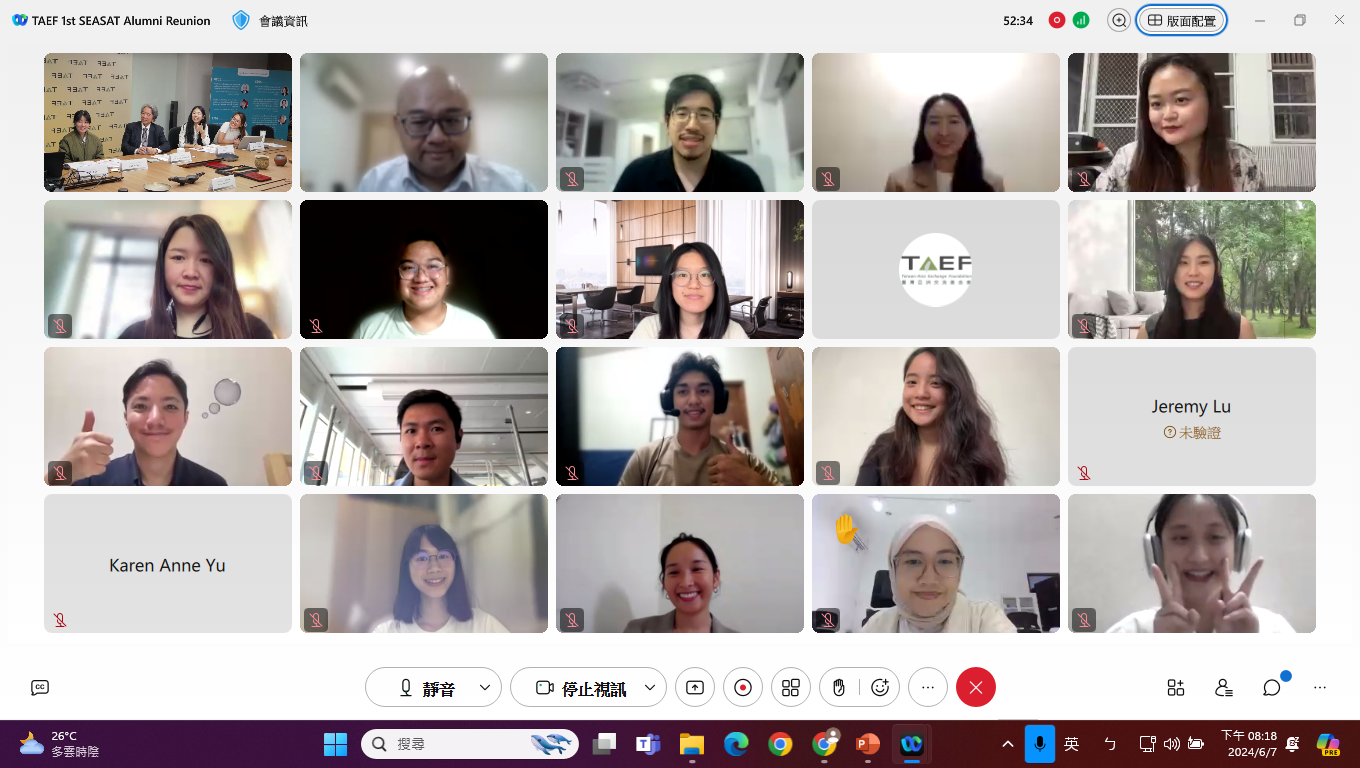
On June 7, 2024, the Taiwan-Asia Exchange Foundation (TAEF) held its inaugural SEASAT Alumni Reunion virtually, celebrating a significant milestone in its journey of incubating young leaders in Asia since its inception in 2018.
The virtual reunion was convened by Dr. Hsin-Huang Michael Hsiao, Chairman of TAEF, and Dr. Alan Hao Yang, Executive Director of TAEF.
Over 30 alumni from Southeast Asia, South Asia, Taiwan, and beyond gathered online to reconnect with peers and meet new friends from various young leaders’ engagement programs under the TAEF, including former Yushan Forum delegates, SEASAT Youth Camp participants, and the Future of Work for Asian Youth research contributors.
In his opening remarks, Dr. Hsiao stressed the TAEF’s vision to bring delegates across the programs under the same “SEASAT Alumni” banner to maximize opportunities for youth, with Taiwan and Asia offering their unique advantages. He also encouraged the alumni to serve as the connecting points in their communities and bring more innovative minds into the “sea” to create positive change.
The reunion event followed into the Alumni Roundtable, “Navigating Youth Leadership in Asia: Building Careers, Expanding International Networks, and Responding to Global Challenges.” Four distinguished alumni from different countries and sectors shared their invaluable insights on future professional landscapes, common challenges, and the importance of international cooperation in their domains.
Catherine Setiawan, currently an AI researcher at the Global South-based Digital Futures Lab, shared her insights on how AI will affect the future of work for youth in Asia. She said that while navigating how AI development will unfold in each country is complex, the best way for youth to future-proof against this inevitable trend is to equip themselves with the knowledge to use it.
Tran Thi Mong Tuyen, a Pacific Forum delegate and researcher who focuses on international relations of Taiwan, Vietnam, and the Indo-Pacific, stressed that understanding geopolitics in the Indo-Pacific region is important for youth in navigating major global trends. She hoped to see more young people invest their effort in this case.
Renesmee Chen, a sustainability consultant at EY Taiwan who is also a long-time volunteer at Taiwan Youth Climate Coalition, pointed out the importance of adapting one’s approach against an issue to societal norms. For example, she mentioned that while protest is a common way of communicating grassroots opinions on climate issues in Western countries, it may not be the most effective method in Taiwan, citing the lower sense of urgency within the society.
Gerald John Cabanilla Guillermo, a political analyst at the Royal Thai Embassy in Manilla who founded an NGO called Keep the Change: Youth Policy Lab to empower youth in public participation, observed that young people in Asia are keen to make their voices heard. While they are actively doing so on social media, they need to be further involved in formal public participation, where they can participate in policymaking. As a follow-up to the roundtable, alumni enjoyed a fun networking session, in which they were asked to share random photos taken in the week as an ice-breaker. They also took the opportunity to exchange ideas on professional fields and share contacts to stay connected after the event.
In closing, Dr. Yang emphasized that the wisdom shared at the roundtable and the reunion event demonstrated the importance for young visionaries bound by shared experiences and common aspirations to work together for the future we aspire to. On this note, the TAEF is eager to make space for all. Dr. Yang called on the alumni to strengthen their bonds through TAEF’s Alumni newsletters and future gatherings.